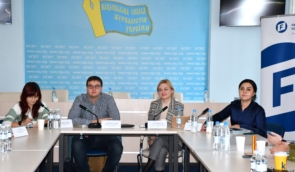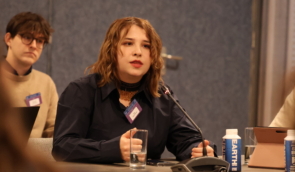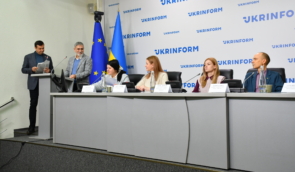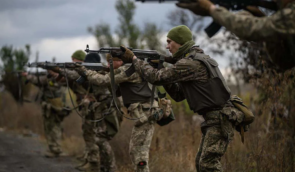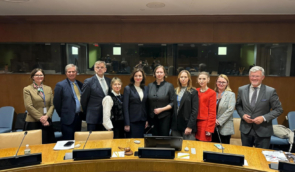ZMINA organised a side event about the occupied Crimea at the Forum 2000 in Prague
On October 15, ZMINA organised a side event “Democracy in the Crosshairs: 10 Years of Repression in the Temporarily Occupied Crimea” at the Forum 2000 in Prague with the support of the Czech MFA. The panel session was joined by the representatives of the Mission of the President of Ukraine in Crimea, the Human Rights Department of the Czech MFA, and the Czech NGO People in Need. Moreover, a recently released political prisoner Leniie Umerova shared the story of her persecution by Russians.
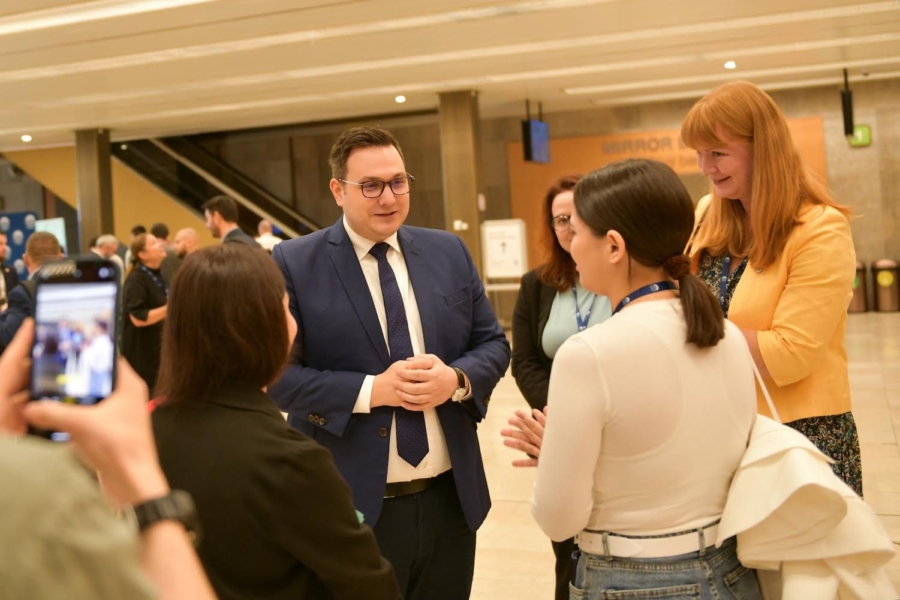 Photo: Leniie Umerova speaking to the Minister of Foreign Affairs of the Czech Republic Jan Lipavský. Photo credits: Czech MFA
Photo: Leniie Umerova speaking to the Minister of Foreign Affairs of the Czech Republic Jan Lipavský. Photo credits: Czech MFARussia’s armed aggression against Ukraine began with the occupation of Crimea in February 2014. Today, it remains de-facto controlled by Russia and has turned into an open-air prison where residents live in constant risk of persecution.
“It is important to remember that Russia’s war against Ukraine began with the occupation of Crimea in 2014. The first victims, both military and civilian, were right here. We remember Ukrainian servicemen Serhii Kokurin and Stanislav Karachevskyi, killed by Russian soldiers. The first civilian victim was the Crimean Tatar activist Reshat Ametov, who was kidnapped and killed for protesting against the occupation. At least 14 Crimean activists, such as Ervin Ibrahimov, have been victims of enforced disappearances. Their fates remain unknown. To date, 218 residents of Crimea have been illegally arrested by Russia, 132 of them are Crimean Tatars,” highlighted Olha Kuryshko, Deputy Permanent Representative at Mission of the President of Ukraine in the Autonomous Republic of Crimea.
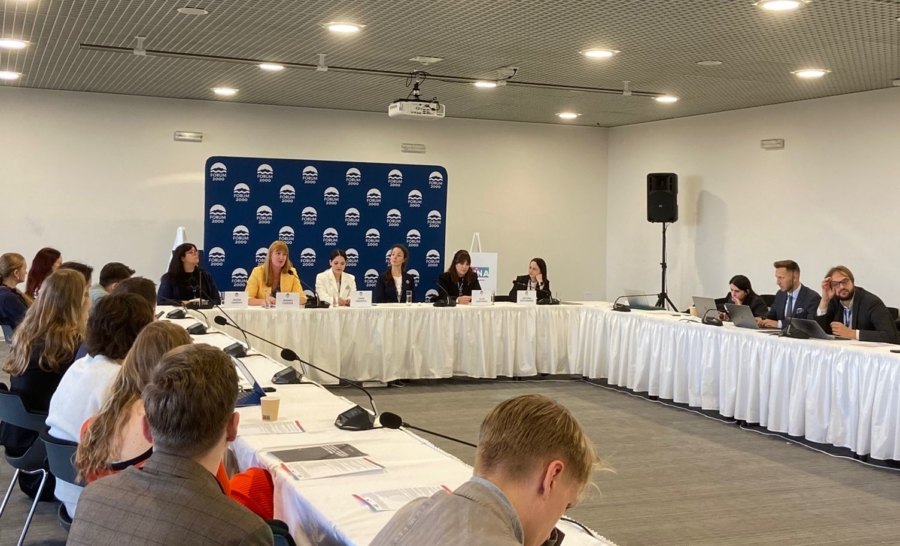
“Since the beginning of the Russian occupation of Crimea, the phenomenon of citizen journalism appeared in the territory of the peninsula, aimed to resist the occupation and to provide Crimean residents and the outside world with objective information on what is going on there. However, the occupation authorities started to oppress activists, media and citizen journalists. Since 2014, at least 21 Crimean journalists have been prosecuted, 15 of them are still behind the bars,” added ZMINA’s Viktoria Nesterenko.
She told that people are being persecuted for thinking differently, for having different beliefs or for different ethnical affiliation – they are being falsely accused of extremism, terrorism, and espionage and sentenced to 10–18 years of imprisonment. The conditions in detention are inhumane – detainees are being forcibly transferred thousands of kilometers away from their native Crimea, isolated from their families and lawyers, tortured, and not provided with medical aid even in critical situations.
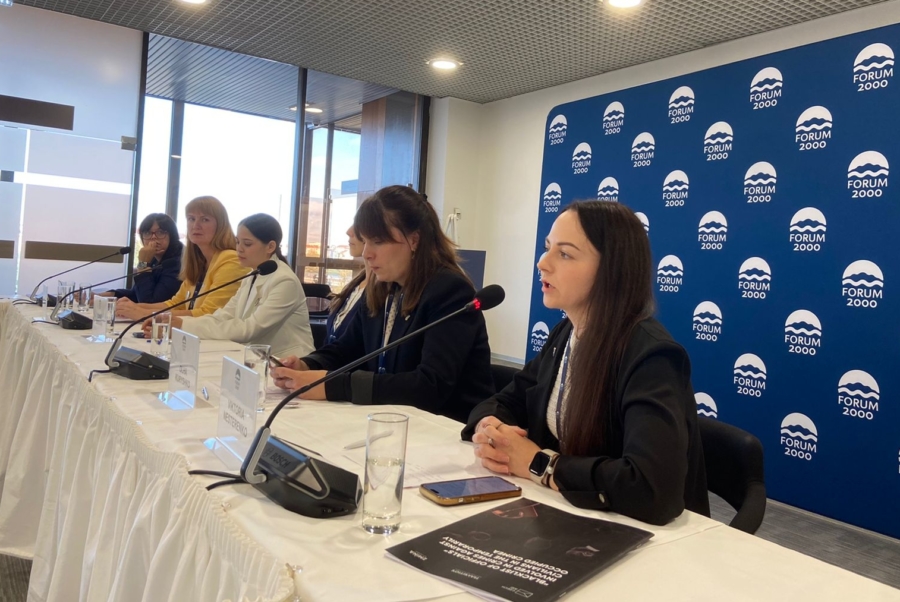
During the last 5 years, only 2 Crimean political prisoners have been released – Leniie Umerova and Nariman Dzhelyal. Leniie Umerova spoke to the participants about the story of her detention:
“In 2022, when I tried to return to Crimea to visit my seriously ill father, the Russian authorities detained me because I did not have a Russian passport. They had been holding me behind bars for half a year without any charges, and then they fabricated accusations of espionage. I was thrown into prisons, isolated from the world, deprived of the right to dignity and freedom. I spent almost two years in captivity, and only in September 2024, thanks to the efforts of my compatriots, the President of Ukraine, Ukrainian human rights defenders and the international community, I managed to return home,” told Leniie.
She mentioned those who are still illegally detained: Appaz Kurtamet, Bohdan Ziza, Iryna Danylovych, the Akhtemov brothers and hundreds of other civilian prisoners of the Kremlin. “We are obliged to fight for their dignity and freedom, for their right to return home. I urge you to join forces to bring these people back. After all, independence and will are not just words,” she called for action.
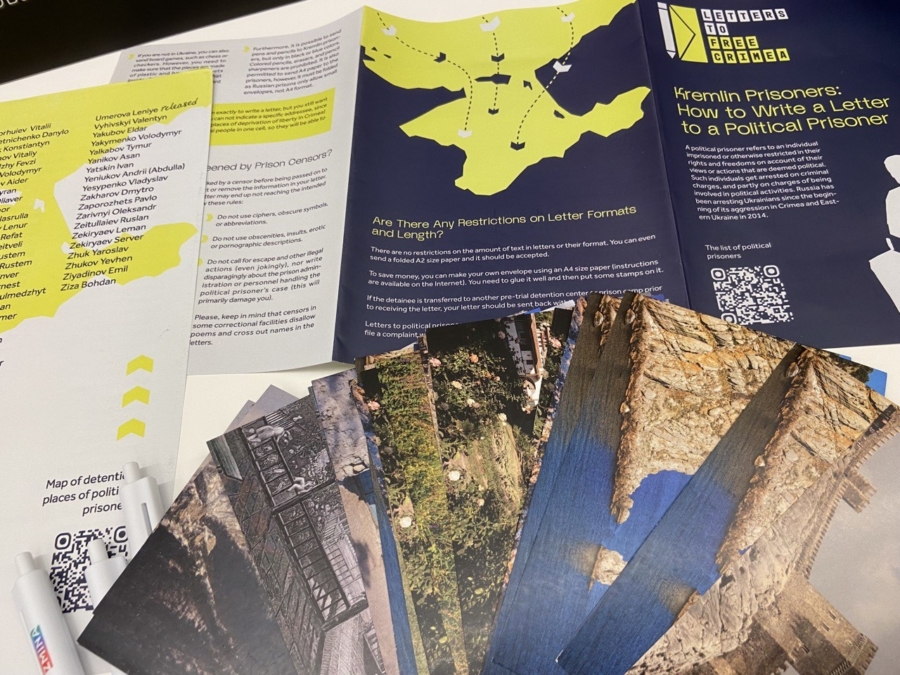
“80 years ago, the Stalinist regime brutally deported Crimean Tatars to Central Asia. These oppressing days are coming back to Europe,” said the Deputy Director of the Human Rights and Transition Policy Department of the Ministry of Foreign Affairs of the Czech Republic Zdeňka Caisová. She said that the international community works on bringing those responsible to accountability and holds Ukraine high on the agenda. In particular, the Czech Republic keeps putting efforts into covering the topic of occupied Crimea intentionally too, supports Ukrainian civil society and independent media, includes names of those in need in the statements, and hosted the 2nd Parliamentary Summit of the Crimea platform.
Speakers called the participants of the event to implement sanctions against those responsible for human rights violations in the occupied Crimea, support the reintegration policy of the occupied territories of Ukraine, engage in the Crimea platform’s activities, spread information about those detained and call for their release, as well as write the “Letters to Free Crimea“.
The project is implemented with the financial support of the Ministry of Foreign Affairs of the Czech Republic as part of the Transition Promotion Program. The views expressed in this material are those of the authors and do not reflect the official position of the Ministry of Foreign Affairs of the Czech Republic.
If you have found a spelling error, please, notify us by selecting that text and pressing Ctrl+Enter.

